What if Google Jobs Disappeared? Unpacking the Impact on Online Recruiting
Google Jobs has been undergoing a lot of turbulence in the world recently. The Jobindex claim against Google is now in session, and this case likely kicked off a full-scale UX redesign of Google Jobs in the EU and the US. Recently, Google also lost a significant monopoly case in the US, which made me wonder—what would happen if Google Jobs disappeared? What will the impact on both small and large job boards, and how will it impact their traffic and business?
Join me in the next 15 minutes for a deep dive into Google Jobs and how it works, as well as recent events around the Jobindex case, the UX redesign and the monopoly case.
What is Google Jobs, and why does it matter so much for job boards?
Google Jobs is a powerful job aggregation and search engine platform launched by Google in 2017. It aggregates job listings from various online sources, including job boards, company websites, and recruitment agencies. It leverages a job posting schema and Google's advanced search technology to provide job seekers with a streamlined, user-friendly interface to find relevant employment opportunities.
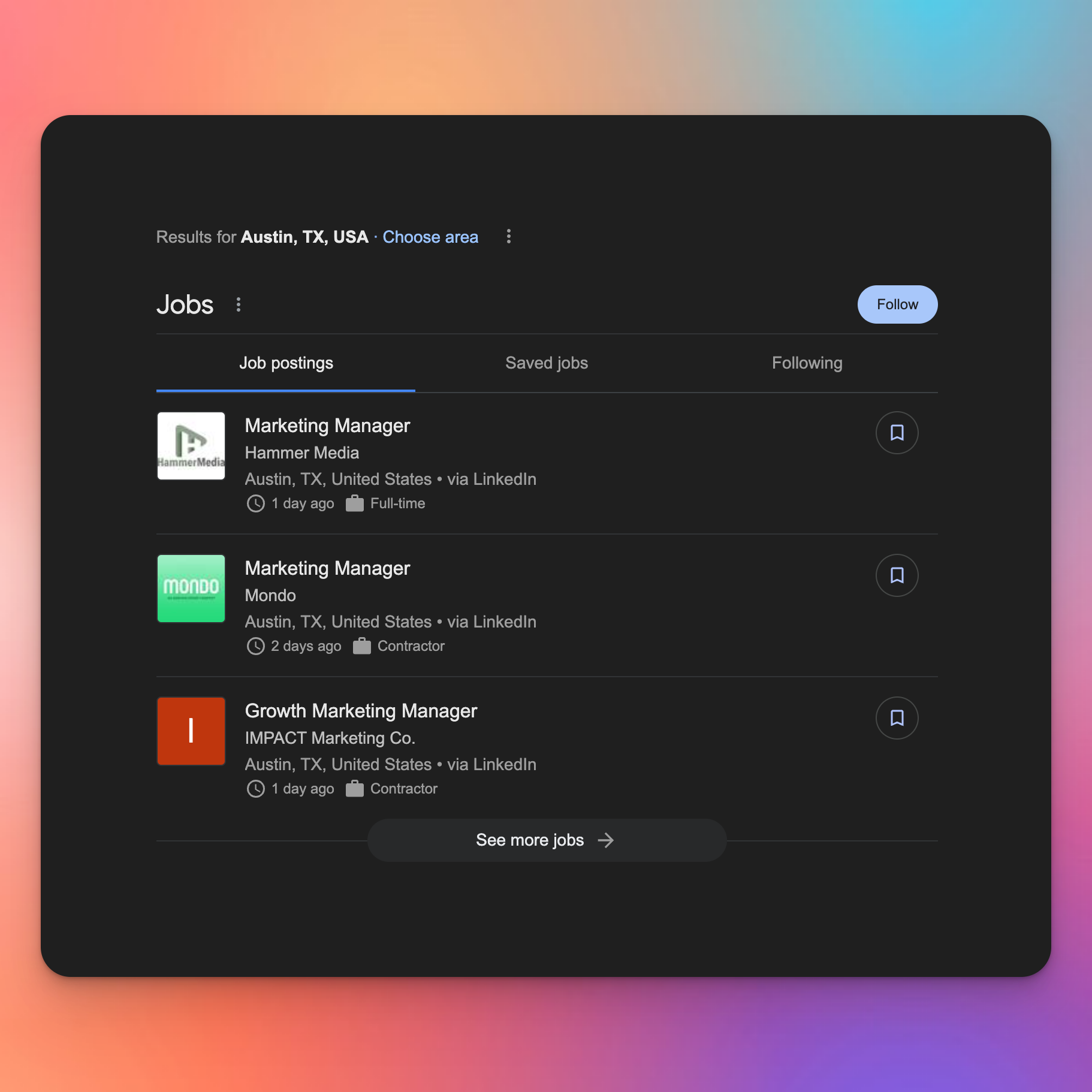
The platform is essential for job boards because it can significantly increase the visibility of their listings, driving more traffic to their sites. By adding the job posting schema and including job postings in Google Jobs, boards can reach a wider audience of job seekers who might not have found their platform. Additionally, Google Jobs' integration with Google Search results means job listings can appear prominently in general search queries, further expanding their reach. However, job boards must ensure their listings are correctly formatted and extended with a job posting schema so that Google Jobs can benefit from this powerful tool in the competitive, fully online recruitment landscape.
What people vastly underestimate is also the brand awareness that Google Jobs creates for job boards. When job seekers open jobs, a list of sources is presented for them to choose where to apply (multiple job boards almost always host jobs). It is a great way to push your job board name to a broader audience and an effect that causes direct traffic.
What is the recent monopoly case Google lost?
A federal judge ruled that Google violated US antitrust law with its search business, declaring the company a monopolist that has acted to maintain its dominance. The court found Google's exclusive deals with Apple and other key players in the mobile ecosystem to be anticompetitive, potentially reshaping how millions access information online. This landmark decision, comparable to major antitrust cases in history, could lead to significant penalties for Google and have far-reaching effects on the tech industry, including the emerging field of artificial intelligence. Google plans to appeal the ruling, which marks a significant victory for the US government in its efforts to rein in Big Tech. Although this does not immediately impact Google Jobs, it is an essential decision because there is another case against Google, this time from Europe and explicitly targeting Google Jobs.
What are the claims in the Jobindex case against Google Jobs?
In a notable legal confrontation, the Danish job board Jobindex has sued Google, alleging copyright infringement by the tech behemoth for incorporating Jobindex's job advertisements into the Google for Jobs service without explicit authorization. According to Jobindex CEO Kaare Danielsen, speaking at Denmark’s commercial court, Sø- og Handelsretten, Google's actions are akin to dealing in counterfeit goods without regard for copyright ownership, an assertion that Google's Nordic region political director, Christine Sørensen, disputes as unfounded. The lawsuit, backed by the industry group Danske Medier, seeks five million kroner in damages and underscores a broader concern about protecting digital content in the era of advanced algorithms and AI-driven platforms. The outcome of this case could set a precedent impacting how job ads and other digital content are treated online.
Now, this argumentation is very weak. In the specific case that Jobindex points out, another company crawled its website, added the job posting schema on the jobs (which Jobindex does not), and submitted the jobs to Google Jobs. This is how our industry works – everyone scrapes everyone. This is what aggregators do, and Jobindex also claims to be the first job aggregator in the world, way before Google even started crawling the web (not my words).
How did the Jobindex Case impact the Google Jobs UX in Europe and the US?
UX Changes
Recent UX changes to Google Jobs across Europe (start of 2024) have also been rolled out to the US. The changes made Google Jobs more integrated into the search result pages rather than a separate search feature (as it was before).
This UX update to Google Jobs features fundamental changes, including presenting job descriptions as snippets rather than full texts, eliminating the "Find jobs on" section to streamline navigation, and reducing the interface's screen space by approximately 30-40%.
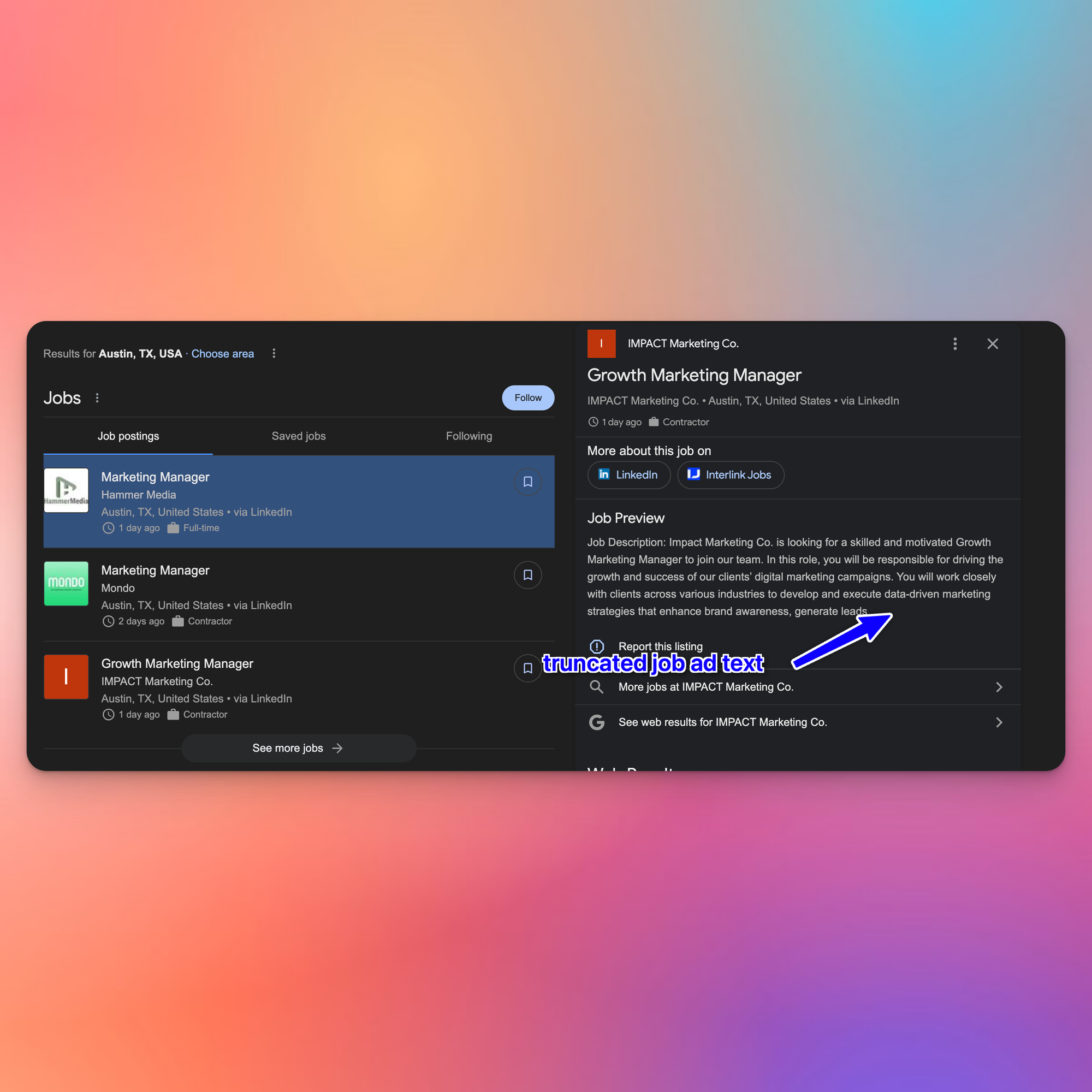
Additionally, job listings now open in a side tab, which helps keep users on the Search Engine Results Pages (SERP) longer. Google has also enhanced its focus on job quality, introducing feedback options for expired job listings and content issues to improve the overall user experience and relevancy of job searches.
Notice the old apply button:

And here is what it looks like today - gone is the apply button - it is not called "More about this job on" and the links to the platforms.

It is easy to see how the job description and apply button change directly relate to Jobindex's copyright claim. The other changes are geared towards reducing Google Jobs’s impact on search, making it less likely to attract a claim.
Search Pages Features
However, Google Jobs did not only get a UX update. We also got a new SERP feature that links back to search pages of job boards, elevating their visibility in search results. This feature, positioned above the Google Jobs interface and beneath sponsored searches, is activated by job-related queries and showcases up to 16 job site results—particularly spotlighting the top four—with the potential for user swiping.
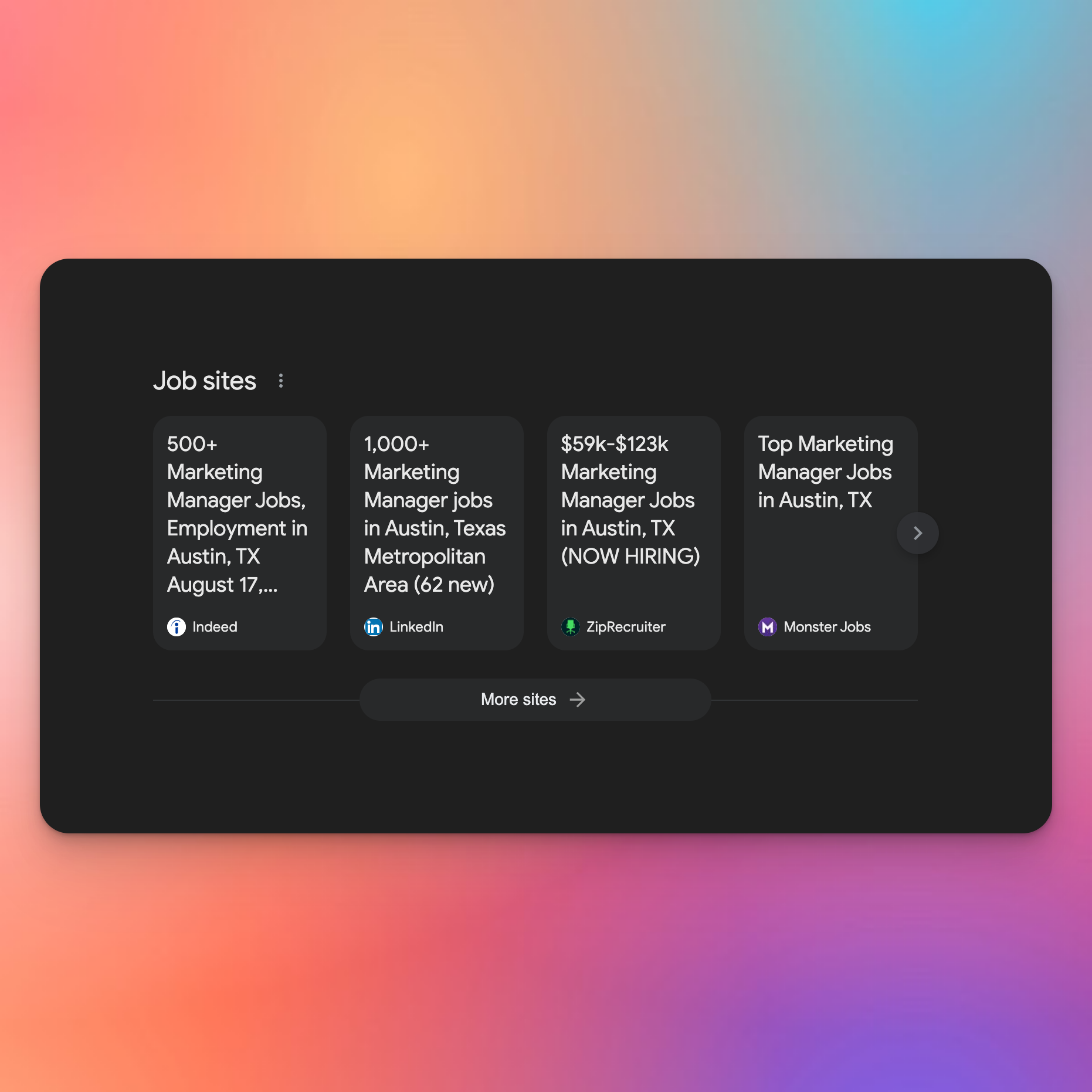
It displays meta-information about the job sites, providing users with sufficient details to make informed clicks directly to the job boards, akin to traditional organic search clicks. This prominent placement demands job boards to focus more intently on technical SEO, content relevance, and page loading speeds to capitalize on this new sub-channel effectively. The feature augments user experience by streamlining access to job listings and posing critical SEO strategy considerations. It potentially signifies a new direction in Google's advertising experiments, reflecting ongoing tests with similar user interface elements in job ads.
What would happen if Google Jobs stops tomorrow?
Chaos, absolute chaos!
No, it is pretty simple.
Loss of organic traffic
Of course, the first thing that will happen is that job boards, aggregators, and ATS platforms will lose their traffic to Google Jobs.
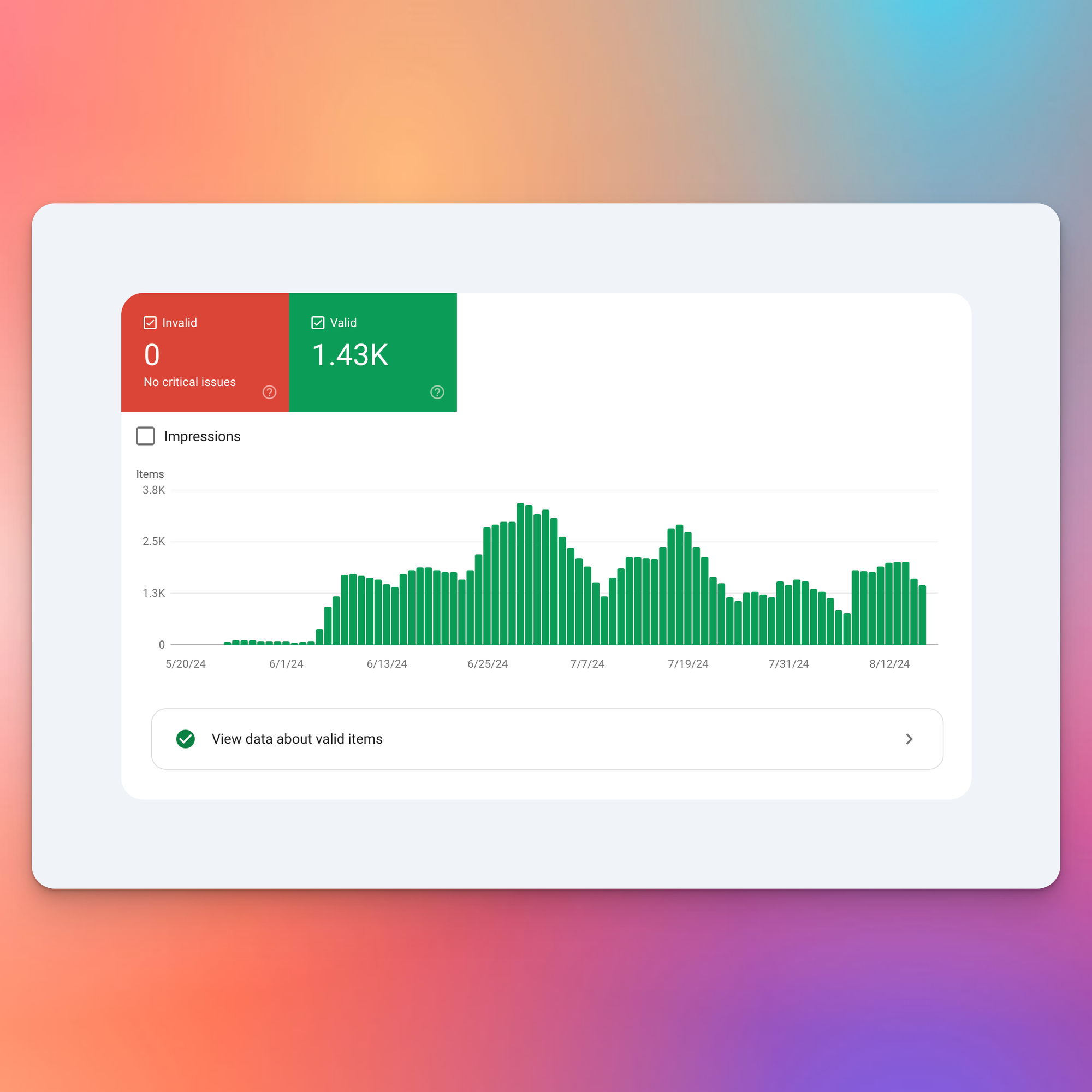
Now, depending on your number of jobs and how your site is built, this can be between 3% and 95% of your organic traffic. Yes, there are job boards that get almost all their traffic from Google Jobs.
Let’s look at how this further impacts small and large job boards.
Impact on small job boards
More minor, niche job boards might experience a decrease in traffic and visibility because they would lose the significant exposure Google for Jobs provides by aggregating their listings. This could be particularly challenging for new or smaller platforms that depend heavily on Google for traffic.
Impact on large job boards
Major job boards with well-known brands like Indeed, ZipRecruiter and Glassdoor could see increased direct traffic as users revert to visiting these platforms individually now that Google Jobs is no longer there to guide them. Wo, are we kidding? Most people are not familiar with small, niche job board brands.
Potential Increase in Paid Advertising
I am sure all programmatic vendors and Google will be pretty happy. Job boards must invest more in marketing and paid advertising to attract visitors that Google for Jobs previously delivered “for free.” This will increase operational costs for job boards and, in my opinion, will make a small subset of niche job boards unprofitable.
Reverting to programmatic job advertising, social media advertising and display campaigns is costly but technically and operationally complex. Small job boards owned by teams of 1-4 people will struggle with this.
Impact on SEO Strategy if Google Jobs stops
If Google Jobs stops, job boards, aggregators and ATS platforms must adjust their SEO strategies. Without the aggregation feature funneling traffic from Google searches, job boards would need to enhance their SEO to appear higher in search results directly, which could lead to increased competition and sophistication in SEO efforts across the sector.
The new Job Sites SERP feature will also become an optimization target. It is an excellent opportunity for sites to capture organic traffic. Large job boards occupy the majority of simple keywords, but plenty of long-tail opportunities exist to capture every market.
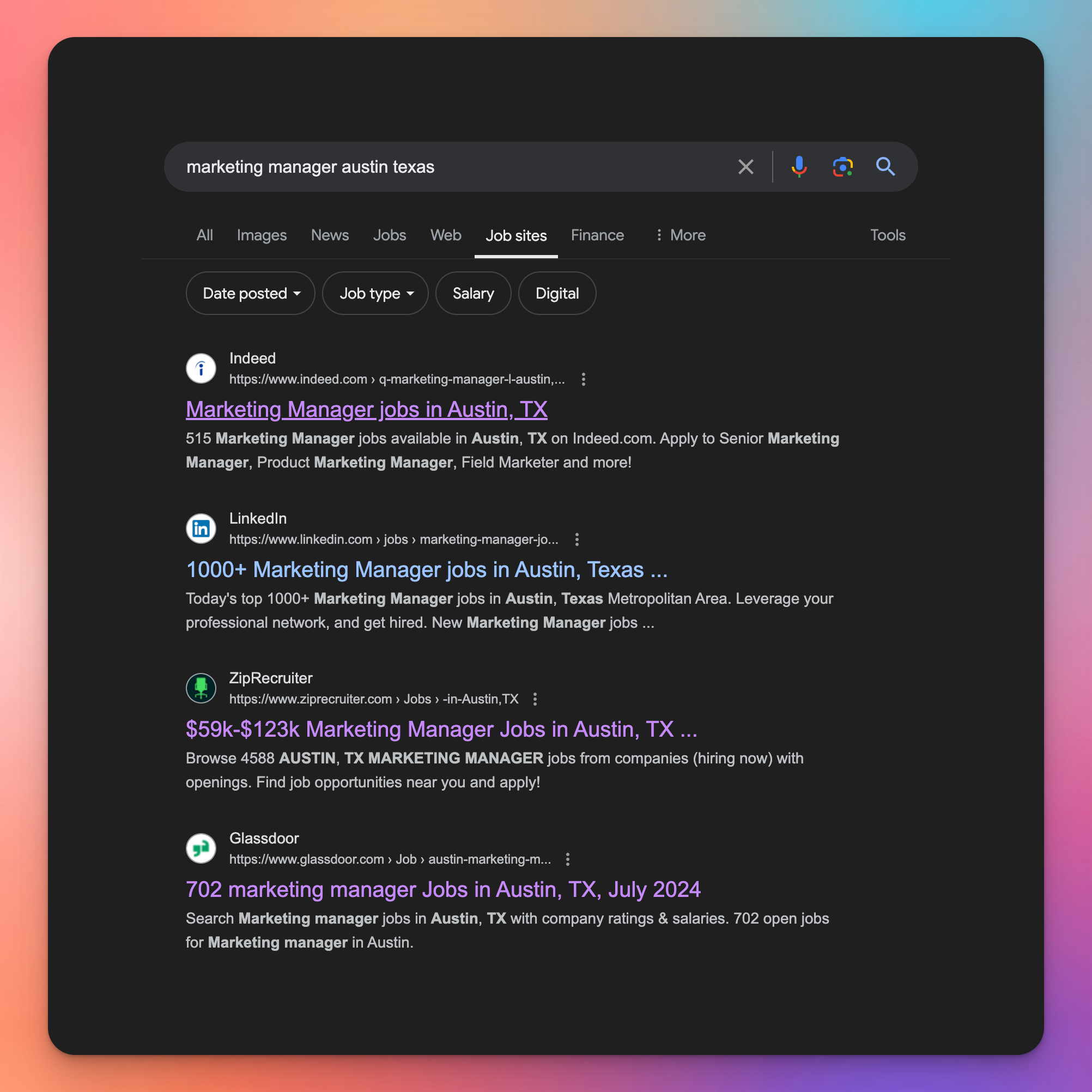
Anyway, with or without Google Jobs as a job board, this is a crucial optimization strategy, so if you still need to do this, please let me know if you need help.
Summary – Google is killing Google Jobs. What would happen?
In this article, we reviewed the current monopoly cases against Google, the legal complaints from Jobindex, the UX changes of Google Jobs most likely driven by these, and a hypothetical scenario where Google Jobs is killed that showed us how small job boards will mostly lose and might even become unprofitable.
In the last part of the Article, I want to give a personal perspective on how likely this will happen.
Honestly, I don’t think Google will kill Google Jobs. Doing such a large-scale UX update and killing a product is not logical. The work was done precisely to give Google a chance to keep the product, even if the Jobindex claim turns out wrong.
Of course, this picture changes pretty fast if Google loses the case. I hope this will not happen because the fundamental logic of the claim is flawed, but explaining this to a non-tech judge who does not understand recruiting will be VERY hard.
If Google loses the case, they will likely have to kill the product, which is quite sad.